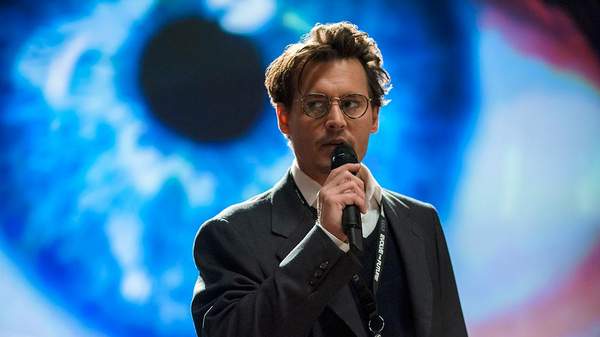Overview
Transcendence feels like a movie out of time. For one, it seeks to pack far too much into its 119-minute run-time, but — more to point — it feels like a movie that's 14 years too late, and not just because it specifically references Y2K without any irony or reminiscence.
Set in the 'could be today, could be tomorrow, but in no way distant' future, it concerns itself with married couple and MIT-supergraduates Will and Evelyn Caster (Johnny Depp and Rebecca Hall). They, along with friends and colleagues Max (Paul Bettany) and Joseph (Morgan Freeman), are amongst the world's leading engineers in the pursuit of a fully functioning, self-aware artificial intelligence. Opposing them is a group of militant luddites operating under the banner of 'Unplug', which again — in the age of wireless — seems markedly dated for such a forward-thinking movie.
When these 'Unpluggists' (as they're definitely not called) launch a series of coordinated attacks against AI-focused research centres, Will winds up mortally wounded, albeit in a manner so unnecessary and bewildering that it's a genuine mystery how and why it was ever included in the plot. As his final days draw near, Evelyn decides to upload his consciousness to a mainframe in the hope that he can live on inside the machine.
It's at this point that things turn bad for both the characters and the film. The compelling ethical questions raised in the first act largely fall away, dismissed with the apathetic resignation of 'oh well, we went and did it so what does it all matter now?' As Will's intelligence rapidly surpasses that of humanity's — a theoretical moment known in conventional science as 'the singularity' and in the film as 'transendence' — his aspirations and ideas become, just like the movie, too broad, too incorporeal and too numerous.
Moments of extraordinary innovation and emotion, such as the bestowing of sight upon a man who'd only ever known blindess, are shown and then dispensed with absent almost any sentimentality or drama. It's not that any of the ideas are necessarily bad, it's just that any one or two of them would have made for an excellent film, whereas all of them combined prove little more than a confusing and threadbare mess.
The glue that binds it all together is the delightful Rebecca Hall, whose performance as the dutiful, then grieving, then wilfully blind accomplice to Will's increasing 'transcendent interventionism' instills some much-needed humanity to the film. Her stubborn refusal to acknowledge the possibility of confirmation bias in believing the AI she's interacting with is anything but her dead husband is both moving and unsettling, demonstrating how important objectivity is in any scientific pursuit, let alone one with global implications.
The recent, exceptional Her raised many of the same questions relating to artificial sentience, and — to put it plainly — did it much better. Given the rate of technological advancement, there's an undeniable sense of inevitability when it comes to the singularity, and doubtless we'll soon see many more films exploring the possibilities (and dangers) of blurring the lines between man and machine. The issues are genuinely fascinating, though future films would do well to learn lessons from Transcendence and explore just one of them instead of all of them.
Information
When
Thursday, April 24, 2014 - Wednesday, May 28, 2014
Thursday, April 24 - Wednesday, May 28, 2014
Where
Various cinemas in MelbournePrice
$15-20-
Event Type
